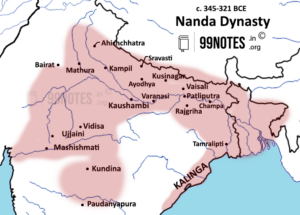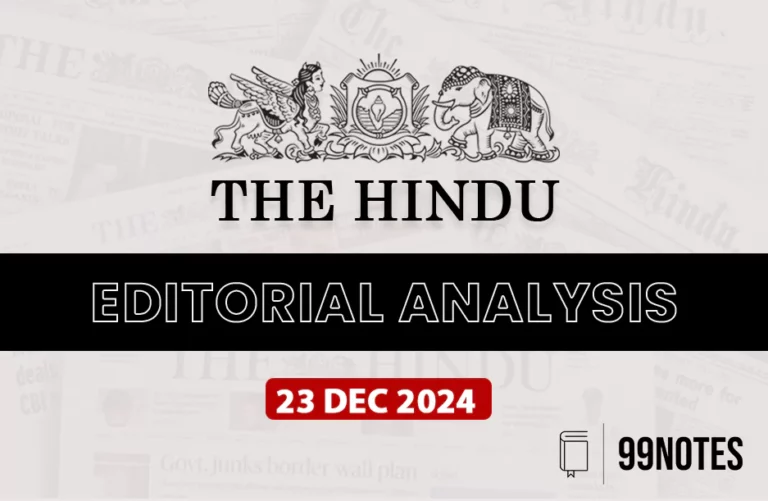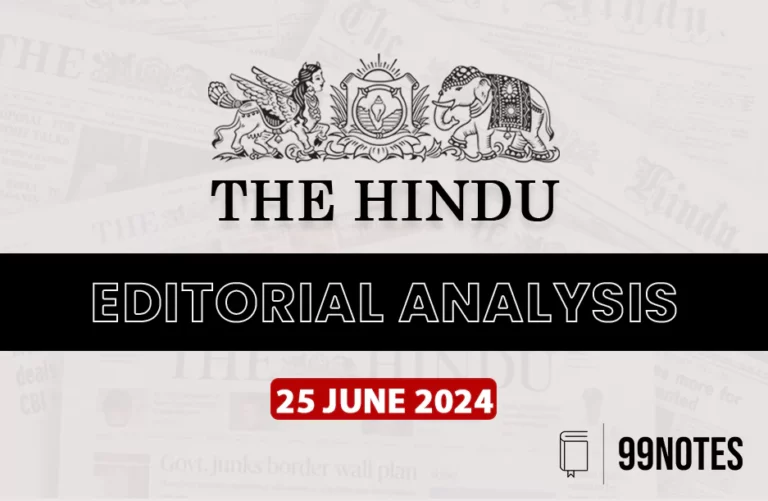1 March 2024 : The Hindu Editorial Notes PDF
The Hindu Editorial
1-March-2024
1. E-evidence, new criminal law, its implementation
| Topic: GS2 – Indian Polity – Parliament – Functioning The article is crucial for UPSC aspirants, providing insights into upcoming changes in Indian criminal laws, especially pertaining to electronic evidence. |
| Context |
| ● The article discusses the impending enactment of three new criminal laws in India, focusing on changes in electronic evidence provisions and potential challenges in adapting to the revamped legal framework. |
Enactment Details:
- Three new criminal laws, Bharatiya Nyay Sanhita, Bharatiya Nagarik Suraksha Sanhita, and Bharatiya Sakshya Adhiniyam, to be effective from July 1, 2024.
- Implementation excludes Section 106(2) of Bharatiya Nyay Sanhita, prescribing 10 years imprisonment for unreported fatal accidents.
Preparation for Transition:
- Ministry of Home Affairs (MHA) and State governments gearing up for a seamless transition.
- Amendments in Bharatiya Nagarik Suraksha Sanhita related to investigation and police functions.
- Minor changes and new offenses introduced in Bharatiya Nyay Sanhita.
Electronic Evidence and Bharatiya Sakshya Adhiniyam:
- Limited changes in the Indian Evidence Act, 1872, under Bharatiya Sakshya Adhiniyam.
- Definitions section provides clarity on electronic and digital records, including emails, server logs, and messages.
- Enhanced provisions for primary (electronic) evidence and admissibility of electronic records.
Clarity on Definitions:
- The laws precisely define “document” to include various forms of electronic records.
- Illustrations under the definition highlight examples such as server logs, emails, and locational evidence.
Key Changes in Electronic Evidence Laws:
- Clearer definitions for primary electronic evidence.
- Introduction of terms like ‘semi-conductor memory’ and ‘communication device’ in Section 63 for better visibility.
- Section 63 deals with the admissibility of electronic records.
Legal Clarity on Electronic Record Admissibility:
- Law settled on the admissibility of electronic records based on the Supreme Court judgment.
- Certificate under Section 65-B(4) (now Section 63(4) of BSA) is crucial for electronic record admissibility.
- Section 65-B and Section 63 considered a complete code by themselves.
Certificate Requirements:
- Section 63(4) mandates a certificate signed by two persons, one in charge of the device and an expert.
- Standard format of the certificate prescribed in the Schedule to the BSA.
- Expert certification increases workload for cyber laboratories.
Impact on Cyber Laboratories:
- Increased workload for cyber laboratories due to expert certifications.
- Potential strain on cyberlabs lacking sufficient manpower and infrastructure.
- Expert opinion necessary when integrity of electronic record is disputed during trial.
Concerns and Recommendations:
- Increased workload necessitates a general awareness drive on encryption modes and methods.
- Private agencies using electronic devices for security purposes urged to be informed about encryption.
- Enforcement agencies need to prepare infrastructure for added responsibilities before the implementation date.
| Practice Question: Examine the significance of the impending criminal law reforms in India, with a specific focus on electronic evidence. (150 words/10 m) |
2. Understanding the world of the informal waste picker
| Topic: GS2 – Social Justice – Vulnerable sections Crucial for UPSC: Examines challenges faced by informal waste pickers, EPR implications, and the need for sustainable plastic management. |
| Context |
| ● The article underscores the necessity of recognizing informal waste pickers, addressing challenges in Extended Producer Responsibility, and emphasizing a just transition in the upcoming Plastic Treaty to ensure sustainable waste management. |
Background:
- March 1, International Waste Pickers Day, commemorates pickers murdered in Colombia in 1992.
- Informal waste pickers form a vital but often overlooked part of waste management globally and in India.
Informal Sector in Waste Management:
- Defined by the International Labour Organization as unregistered individuals or small enterprises in waste management.
- Primary collectors of recyclable waste, contributing significantly to resource efficiency.
- Face marginalization, lack of recognition, representation, and exclusion from social security and legal frameworks.
Data on Informal Waste Pickers:
- Global estimates indicate the informal waste economy employs 0.5%–2% of the urban population.
- In India, approximately 1.5 million waste pickers in the urban workforce, with half a million being women.
- Engage in hazardous work without safety equipment, facing health issues, irregular work, low income, and harassment.
Challenges Faced:
- Subordinate position in the caste hierarchy compounds issues.
- Private sector participation in waste management alienates them, exacerbating vulnerability.
- Private actors’ use of expensive machinery marginalizes informal pickers, pushing them into hazardous waste picking.
Extended Producer Responsibility (EPR):
- EPR gains traction in India for plastic waste management, holding commercial waste producers accountable.
- In practice, EPR redirects waste away from the informal sector, potentially displacing informal waste pickers.
- EPR Guidelines in India lack clarity on the inclusion of waste pickers and their representing organizations.
Global Role of Waste Pickers:
- Globally, waste pickers collect up to 60% of all plastic, crucial for sustainable recycling.
- Informal waste pickers collected 27 million metric tonnes of plastic waste in 2016, preventing environmental damage.
- The plastic treaty must ensure a just transition for waste pickers.
India’s Plastic Waste Challenge:
- India’s per capita plastic waste generation is rising; plastic overshoot day is January 6.
- EPR mechanism involves large recycling units, excluding the informal workforce responsible for waste transformation.
- Waste pickers possess traditional knowledge that could strengthen EPR implementation.
Conclusion:
- There is a need to rethink EPR formulation to integrate informal waste pickers into the legal framework.
- Acknowledging traditional knowledge and expertise of waste pickers in waste management is necessary.
| Waste Management in India – And Informal Sector |
Waste Management Challenges in India
The Informal Sector: Backbone of Waste Management
Challenges for the Informal Sector
Opportunities for Improvement
|
| PYQ: What are the impediments in disposing the huge quantities of discarded solid wastes which are continuously being generated? How do we remove safely the toxic wastes that have been accumulating in our habitable environment? (150 words/10m) (UPSC CSE (M) GS-3 2018) |
| Practice Question: How can Extended Producer Responsibility (EPR) in waste management ensure social inclusion and protect the rights of informal waste pickers? (250 words/105 m) |
For Enquiry

1 March 2024 : The Hindu Editorial Notes PDF

1 March 2024 : Indian Express Editorial Analysis

29 Feb 2024 : Daily Current Affairs Quiz

29 Feb 2024 : Daily Answer Writing

29 Feb 2024 : Daily Current Affairs

29 February 2024 : The Hindu Editorial Notes PDF

29 February 2024 : PIB Summary for UPSC

29 Feb 2024 : Indian Express Editorial Analysis

Magadha Empire (544-320 BCE): Ancient India’s Glorious Kingdom (Ancient History Notes)

28 Feb 2024 : Daily Current Affairs Quiz
March – The Hindu Editorial 1 March 2024 : The Hindu Editorial Notes PDF The Hindu Editorial
29-February-2024
1. Vignettes of a Janus-faced economy
Topic: GS3 – Indian Economy
UPSC…
Indian Express 1 March 2024 : Indian Express Editorial Analysis Indian Express Editorial Analysis
1-March-2024
1. HOW TO REDUCE CHEATING
Topic: GS2 – Social Justice…
Daily Quiz 29 Feb 2024 : Daily Current Affairs Quiz 29 Feb 2024 : Daily Quiz…
mains answer writing 29 Feb 2024 : Daily Answer Writing Mains Answer Writing
29-February-2024
Q1) The transfer of judicial powers to quasi-judicial bodies has…
Daily Current Affairs 29 Feb 2024 : Daily Current Affairs Daily Current Affairs
29-February-2024- Top News of the Day
1. Genome India Initiative: Mapping the…
Feb 2024 The Hindu 29 February 2024 : The Hindu Editorial Notes PDF The Hindu Editorial
29-February-2024
1. Vignettes of a Janus-faced economy
Topic: GS3 – Indian…
feb 2024 PIB 29 February 2024 : PIB Summary for UPSC PIB Summary for UPSC
29 February -2024
1. India calls for restoration of Appellate Body and Dispute…
Indian Express 29 Feb 2024 : Indian Express Editorial Analysis Indian Express Editorial Analysis
29-February-2024
1. We, the consumers
Topic: GS3 – Indian Economy…
Ancient India Magadha Empire (544-320 BCE): Ancient India’s Glorious Kingdom (Ancient History Notes) Magadha Empire
The Magadha Empire was a significant ancient Indian kingdom, renowned for its contribution…
Daily Quiz 28 Feb 2024 : Daily Current Affairs Quiz 28 Feb 2024 : Daily Quiz…


